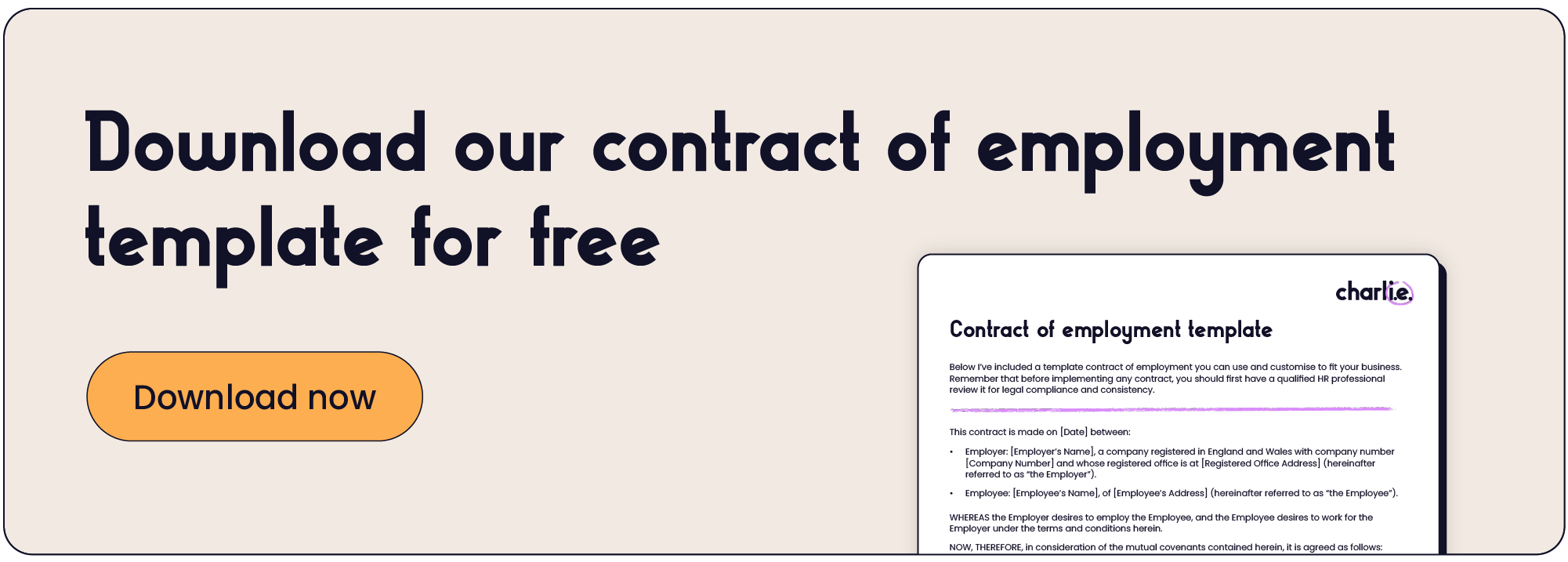Employment contracts 101: essential tips and best practices

For small business owners, navigating the maze of legal intricacies can feel overwhelming, particularly with things as sticky as employment contracts.
Employment contracts are vital to stay on good terms with your employees as they clearly define roles, expectations, and professional boundaries.
In this post, I'll focus on simplifying clauses and obligations in company contracts, and help you gain confidence in creating contracts that meet UK legal requirements, hold up under scrutiny, and create a better and more cohesive workplace.
What is a contract of employment?
A contract of employment is an agreement—implied, verbal, or written—between an employer and an employee.
This legally binding document outlines:
- the terms, rights, and responsibilities of both parties
- the blueprint for the employment relationship.
Employment contracts provide certainty, legal compliance, and a bulwark against unpredictability.
They’re essential for:
- Setting out expectations and standards of performance for each role.
- Creating a legal framework for disputes or terminations of employment.
- Outlining the conditions under which employment can be terminated, giving structure to a sometimes tortuous process.
Essential components of an employment contract
A contract that meets the specific needs of your business and complies with UK employment law keeps your business together and makes the terms of your relationship with your employees crystal clear. Generally, a contract of employment will include:
- Employer and employee details – Your contract should stipulate the complete name and address of both you and the employee.
- Job title and description – include a specific title and detailed description of the role and its responsibilities.
- Employment duration – state whether the position is permanent, temporary, or fixed-term with start and, if applicable, end dates.
- Working hours and location – clearly define your regular working hours, the location of your workplace (if any), and whether the role is on-site, remote, or flexible.
- Salary and compensation – include how much the employee will be compensated, how frequently, and any overtime rates if applicable.
- Benefits – 0ffer details of any benefits included such as pension schemes, gym memberships, or holiday entitlement.
- Leave entitlement – having clearly defined leave entitlement helps with work-life balance management. Include details of any benefits such as annual leave, sick leave, parental leave, etc.
- Notice period – how much time does each party need to give to terminate the employment? State how much notice period is necessary here.
- Probation period – a contract should have also a mention of how long the probation period is to avoid any confusion and give clear expectations.
- Confidentiality clause – how does your business protect its trade secrets and confidential information from prying eyes? Include any non-disclosure agreements to protect your proprietary information.
- Non-compete clause – Should ex-employees not engage with competitors for a specified period? And in what capacity?
- Dispute resolution – in the unfortunate event of disagreements, define a clear path to resolution like workplace mediation.
Legal considerations
Knowing that your contracts are in line with UK employment law ensures that they are not only fair but are legally sound.
The Employment Rights Act 1996 lays down the statutory rights of employees and employers. Your employment contracts should comply with these standards, as deviation could result in legal challenges.
Employment contracts, despite potentially having termination clauses, can still be legally binding under certain scenarios beyond their apparent conclusion.
Confidentiality and non-compete clauses can persist post-employment to protect the business. These clauses should be reasonably limited in duration, geography, and scope to be enforceable, balancing business protection with employee freedom.
In cases of disputes, UK law regarding employment contracts emphasises resolution through structured dialogue and mediation before escalating to legal proceedings, promoting a solution-oriented approach.
Always ensure that your employment contracts are meticulously drafted and reviewed, reflecting an understanding of legal obligations and rights. This proactive and empowered stance protects your business and champions a transparent, respectful, and fair workplace culture.
This is something our HR advisors can do – find out more about our CIPD experts.
Contract of employment template
Below I've included a template contract of employment you can use and customise to fit your business. Remember that before implementing any contract, you should first have a qualified HR professional review it for legal compliance and consistency.
This contract is made on [Date] between:
- Employer: [Employer's Name], a company registered in England and Wales with company number [Company Number] and whose registered office is at [Registered Office Address] (hereinafter referred to as "the Employer").
- Employee: [Employee's Name], of [Employee's Address] (hereinafter referred to as "the Employee").
WHEREAS the Employer desires to employ the Employee, and the Employee desires to work for the Employer under the terms and conditions herein.
NOW, THEREFORE, in consideration of the mutual covenants contained herein, it is agreed as follows:
Job Title and Description
- Position: The Employee is employed in the capacity of [Job Title]. The Employee's duties and responsibilities shall include [List of Duties], and any other tasks assigned by the Employer from time to time. The Employee agrees to perform their duties faithfully and to the best of their ability and to abide by the rules and policies of the Employer.
Place of Work
- The Employee's primary place of work will be at [Workplace Address], or at any other place as the Employer may reasonably require for the proper performance of the Employee's duties.
Commencement and Duration
- This contract is effective from [Start Date] and will continue until terminated by either party as provided for within this contract.
Probation Period
- A probationary period of [Probation Period, e.g., 3 months] will apply, during which both parties may terminate the employment with [Notice Period during probation, e.g., one week's] notice.
Hours of Work
- The Employee's normal hours of work are [Hours per week, e.g., 40] hours per week, from [Start Time] to [End Time], [Days of the Week Worked].
Salary
- The Employee will receive a salary of [Annual Salary] per annum, payable in monthly arrears directly into the Employee's nominated bank account on the [Day] of each month.
Holidays
- The Employee is entitled to [Number of Days] days of paid holiday per year, in addition to public holidays. The holiday year commences on [Date].
Sick Leave and Pay
- The Employee is entitled to statutory sick pay by UK employment law.
Pension
- The Employer will comply with the auto-enrolment pension scheme requirements under UK law.
Termination
- Either party may terminate this employment by providing [Notice Period, e.g., one month's] notice in writing. The Employer reserves the right to pay instead of notice.
Confidentiality
- The Employee agrees not to disclose or use for their benefit any confidential information relating to the business of the Employer.
Governing Law
- This contract shall be governed by and construed following the laws of England and Wales.
IN WITNESS of which, the parties have executed this contract as of the date first above written.
EMPLOYER:
Signature: ______________________
Name: [Name]
Title: [Title]
Date: ______________________
EMPLOYEE:
Signature: ______________________
Name: [Employee's Name]
Date: ______________________
Common mistakes when creating employment contracts and how to avoid them
Making mistakes in your employment contracts is easy to do but can come with some bad legal consequences if you’re not careful. Here are a few things to look out for when making your employment contracts and how to avoid them.
Vagueness and lack of specificity
Precision is key—be as detailed as possible to avoid interpretations that may hurt your business interest. For instance, instead of stating "employees must be punctual," specify the expected time and consequences of not adhering to it. This clarity sets clear expectations and avoids misunderstandings.
Ignoring legal updates
The law is a moving target. Keep your contracts updated and informed about the latest legal changes in the employment sector. This not only ensures compliance but also demonstrates a high level of professionalism and care for your employees' rights.
Not considering individual circumstances
Employment contracts should not be one-size-fits-all. Consider individual circumstances such as employee roles, seniority, and unique arrangements to tailor the contract accordingly. This fosters a sense of inclusivity and partnership with your employees.
Overlooking employee rights
Remember, your contracts are not above the law. Ensure they dovetail with the legal rights your employees are entitled to receive. This not only protects your business from legal action but also shows respect for your employees and their rights.
Storing your contracts on a Drive or unsecured support
To make sure your employees and your business are protected, you should store your employees contracts somewhere safe.
Instead of simply saving them on your computer under a file (which can be targeted by hackers), you should outsource this to a cloud software provider.
At Charlie, we give you the possibility to store all of your legal documents in one place and completely secured by being ISO/IEC 21001 certified and GDPR compliant.

Implementing new employment contracts at your business
Introducing Contracts to New Employees
The first impression is the last. Schedule a meeting to walk through the contract with new hires, allowing them to ask questions and clarify terms. Ensure the introduction process is thorough and well-communicated through the onboarding process.
Managing Changes and Updates
When contract terms need to be updated, communicate changes clearly and promptly to all affected employees. Record the changes and ensure all employees acknowledge and agree to them. This demonstrates transparency and respect for your employees' rights.
Addressing Non-Compliance
If an employee violates the terms of their contract, it is important to have a clear protocol in place to address non-compliance. This includes clearly outlining consequences and providing support to help the employee get back.
We hope this guide helped you see more clearly into employment contracts – check out our other resources on HR compliance if needed.




